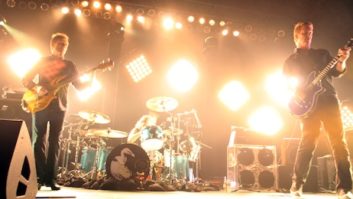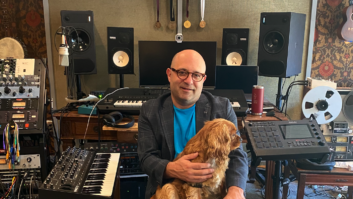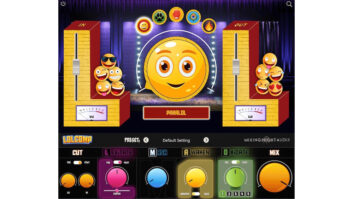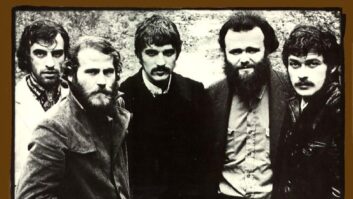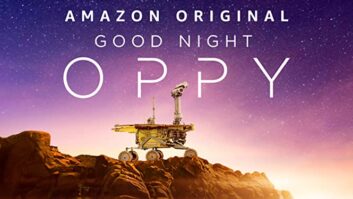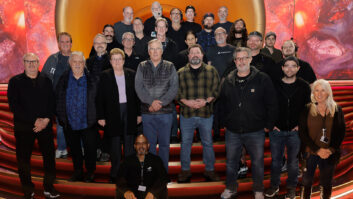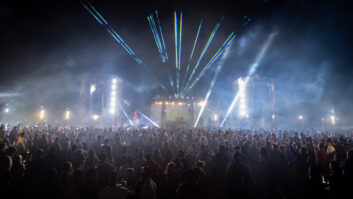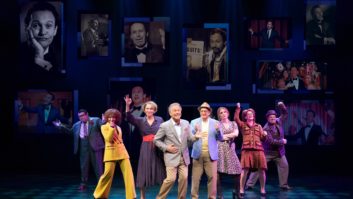Them Crooked Vultures, featuring (l-r) Led Zeppelin’s John Paul Jones
on bass, Foo Fighters’ Dave Ghrol on drums, and Queens of the Stone
Age’s Josh Homme on vocals and guitar, tore it up each night on their
fall U.S. tour, hearing their thunder via d&b Audiotechnik wedges.
Photo: Steven J. Messinaby Clive Young.

It sounded like a rock fan’s fever dream: a supergroup created out of musical interest instead of career slumps, barnstorming across the U.S. with little publicity, playing only brand-new songs that no one had ever heard before. Oh—and the parent bands of the group were Foo Fighters, Queens of the Stone Age and, er, Led Zeppelin.
It wasn’t a dream though; it was the fall tour for Them Crooked Vultures—a venture that includes Zeppelin’s John Paul Jones on bass, the Foos’ Dave Ghrol on drums, the Queens’ Josh Homme on vocals and guitar, and cult act Eleven’s Alain Johannes on guitar. The tour itself was as underground as it could be, considering the players involved…and the fact that they were selling out 3,500-seat rooms without having officially released any music. Sporting ticket prices that were just high enough to keep out the merely curious, the audiences were packed with the fervidly faithful—and they got what they came for: hard rock with some honest-to-God heft to it. It was heavy.
Carrying that weight across the country was Delicate Productions (Camarillo, CA), which provided FOH control gear and a full monitor set-up for the 16-date jaunt. Jockeying the consoles were FOH engineer Hutch (Patrick Hutchinson) and monitor man Ian Beveridge.
It’s old concert biz wisdom that fans come out to hear music they know and that they want the songs to sound as close to the familiar recorded versions as possible. Since the band’s self-titled album wasn’t out yet at the time of the tour, there was no need to carbon-copy the CD, but that didn’t mean it was a sonic free-for-all either.
Sitting aside his Midas Heritage 3000 at FOH, Hutch explained, “I guess that’s a bit of a luxury, but all these musicians are very specific about what they did on their record and we’ve repeated it, tried to duplicate the important things. Some of it is impossible, I think, but the nuts and bolts and important information? We definitely try to replicate.”
In an age where digital desks are the norm for FOH positions, the Midas desk on hand was used to achieve that familiar analog sound: “I think if you look at how the band recorded themselves and the instruments they used, it seems appropriate; it seems like the right desk for the job.”
Keeping that analog ethos in mind, there were plenty of outboard units at the mix position as well, including more than half a dozen Empirical Labs EL8s (“You can never have enough Distressors”), a SPL Transient Designer, a classic Tech 21 Sans Amp PSA 1.1, and even an old DeltaLab Effectron II.
“All kinds of magic out here,” Hutch chuckled. “That’s why it’s called magic–yes, some cool shit, like my old Effectron. It’s really out of date–an old piece of dinosaur gear that buzzes and shorts out all the time, but it’s got a beautiful pitch when you crank up the repeats and the speed. We have a really nice sweeping control, it’s got a cool flange for effect in it. It’s a piece of garbage but I love the sound of it. Best part? It has this broken button that jams and you can get this beautiful vocal doubler out of it. We’ve had this since Josh, the singer, had a band called Kyuss, an incredible rock band that I mixed sound for, and we’ve always used it as his doubler.”
Miking for the tour was tackled with a variety of microphones ranging from the expected names—Sennheiser, Shure, Audix—to more unusual picks, like studio mics from Blue Microphones. “Whatever is the right mic, hopefully we have on there,” said Hutch. “We’re still feeling it out really; it’s kind of a work in progress. They’re still experimenting, so we’re just trying to follow their lead.”
Over at stageside, Ian Beveridge oversaw a Yamaha PM5D, which fed sound to a slew of d&b Audiotechnik wedges; given the old-school vibe, it should be no surprise that in-ears were out on the TCV tour. Asked if any bandmembers were requesting unusual mixes, Beveridge laughed, “There’s nothing unusual about unusual. Everybody I’ve ever worked for has always had an interesting mix, but the thing to do is learn what they want and then make that happen. Everybody’s different, so there’s nothing unusual about it being unusual. Get to know your peeps–figure out what’s normal for them and then go from there. And again, it’s all evolving because this band is so new. They’re going to need to hear different things at different times, and then the focus [of what they need] might change onto something else, so it evolves.”
The two engineers have known each other for years, but working on the TCV world tour, which starts up again later this month in Australia, marks the first time that they’ve collaborated on a production. For Hutch, the journey of becoming a concert engineer began in high school: “Friends picked up instruments and I was theatre guy in school–always wanted to do the drama thing, always liked the production, putting up the lights and dressing the stage and whatever it took, so [going into live sound] just made sense–it’s just like a continuation of that. Over the years, I’ve mixed Queens of the Stone Age, Eagles of Death Metal, Screaming Trees, the Cramps, Taj Mahal, did a turn with Hole, Wolfmother–all kinds of people.”
Beveridge, who?s been behind the monitor desk for acts like Green Day, Weezer. the Lemonheads and Hole, has a similar story, albeit one that’s slightly macabre: “I played in bands, and I used to dig graves during summer vacation at school. So, I dug enough graves that I could buy the first four-track cassette machine in Scotland, and that was the start of recording everything and anyone we could persuade to stand in front of a microphone. Wanted to get out of the grave digging—it’s a dying business!”
Them Crooked Vultures’ live show is still a work in progress—the band made its live debut last summer and began its first world tour less than two months later. As a result, the engineers, audiences and even the group itself were still discovering exactly what TCV live actually was. There was no night more fraught with discovery, however, than the band’s live debut in Chicago last August: “I gotta say, the first one was pretty exciting, man,” said Hutch, “because you just didn’t know how it was going to go, but that opening night, it was amazing. It’s awesome to watch people as a group hear something for the first time, all sharing a brand-new experience.” Whether that was the audience, or the band before them, he didn’t say.
Delicate Productions
www.delicate.com
